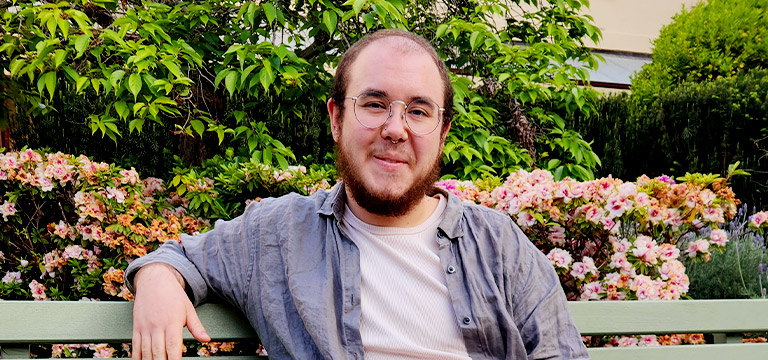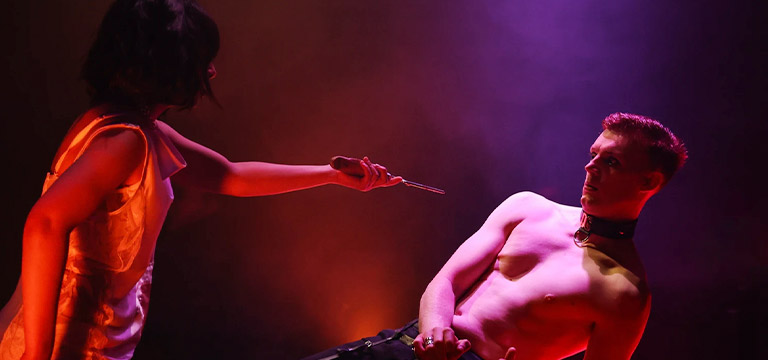
Intimacy coordinators are everywhere at the moment. Fans look out for them in their favourite TV shows to see if a spicy scene is coming up and actors are constantly talking about them. But what’s it like to be one, and what can we learn from them about connecting with other people? Recently, I was able to sit down with my friend Micah, an intimacy coordinator for theatre and live performance – and this is how our conversation went.
Note: the following conversation has been edited for length and clarity.
How did you become an intimacy coordinator?
Micah: I started in the arts when I was in high school – as a lot of people do.
Matt: Yep, can confirm!
Micah: Theatre kids love talking about what they did in high school! From there I decided to try and pursue production and then I took a break for various reasons – including the lockdowns. I went into more, I guess, queer adult spaces to find community and build relationships I had not experienced before. And from there I realised there was a real gap in a lot of Australian theatre with representations of queerness or any identity from the ‘my lived experience’ of it.
So there’s 100% that sort of knowledge I’m bringing from movement classes I did in high school all the way to getting a degree that involved culture and communications, and it’s been one of those things where it’s all come together to produce one interesting me where I have the ability to hold space for people.
How does holding space for people relate to intimacy coordination?
Intimacy coordination as a whole – and I mean any type of intimacy – isn’t something that should be rushed into by anybody. There’s a real tension between the desire for people to see or watch something that’s real versus what people can really do on stage and what people are comfortable doing on stage.
I’m very comfortable creating a container or a space for people that haven’t experienced things to step into and kind of teach people about what it means to consent to perform something. Or what does consent mean in general as well as kind of a basic starting point for live performance.
What’s the strangest thing you’ve dealt with as an intimacy coordinator?

Strange for a vanilla person? I worked on a BDSM adaptation of Don Giovanni with BK Opera recently. I helped choreograph some bondage scenes, so B, the use of some discipline items, so D. There was a leather implement of some sort. S – sadomasochism, which is already really written into Don Giovanni. There was very good submission and domination as well. I tried to make it so that was depictions of every form, at least in pictorial form. What do you call it?
Matt: Vignettes?
Yeah, like little vignettes. I did a little bit of work with the leads but not so much. I worked a lot with the chorus.
Matt: Because they’re the ones setting up the vignettes while the leads are doing the performance?
Exactly. And so really working with those chorus members to say “What would you be comfortable doing? This is my idea of how I want this scene to go, is that something that you’d be comfortable portraying on stage?” and we got to a relatively good place with it. It’s opera, it’s Australia, it was the first time it had really been done. It could have gone deeper in a lot of ways. But honestly, the cast did an amazing job!
Being able to say I was a part of getting these people to do this on stage in a major Melbourne arts venue is massive. And beyond that being able to say those cast members felt safe enough to do that on stage – with critics watching, with in some cases family and friends coming along and seeing the shows. And to an extent being able to hold space for that project was really, really wonderful. It also got really well reviewed!
Has your work as an intimacy coordinator changed how you relate to people?
Oh, massively. I don’t think I actually learned about consent in high school!
Matt: I didn’t.
I don’t think a lot of people did. And it’s a big change that’s been happening over the last 10 years. It’s a massive change. And so we’re getting people who are coming into the performance industry who can have zero ideas about consent because they’ve never heard the word before, or have grown up through the ‘Me Too’ movement, and honestly, sometimes still don’t know what consent means.
Consent doesn’t mean you don’t live a life. And I think a lot of people my age and under have a lot of difficulty identifying – like “Oh well, I have to consent to everything so I can’t do anything”? That’s something that I’ve seen a lot through various projects that I’ve worked on. Where there’s the internal voice from media we’ve consumed over the last 10 years that says ‘Consent is important. Consent is important. Consent is important’, but how do you ask for it, and what is it?
Really breaking it down, consent is the ability to say yes or no. And there’s always going to be consequences for actions. That’s what makes it an action. It’s always going to impact someone else. There are ways to do it that are nicer. There are ways that consider things like intersectionality, and tone of voice, and how you’re addressing someone. But at the end of the day being able to say ‘No I don’t want to do that’ is so important.
Read more: How to make consent sexy by Amy Louise.
We’re in this weird time where everyone wants to say yes to everything but maybe doesn’t understand what they’re saying yes to. Or the implication to what they’re saying yes to in 10 years. And that’s fine. You don’t have to consider everything ever. No one would ever do anything if we did. But being able to say ‘In this very present moment, I’m very interested in doing XYZ and that’s all I want’ or ‘I feel comfortable of trying something with the option of no at any time’.
In my personal life, being an intimacy coordinator has massively affected me. I don’t know if it’s a society thing, but there’s a lot of difficultly people have in saying ‘Yes I made a mistake’?
Matt: Well we’re expected to be perfect.
Micah: Exactly. Being perfect leaves no room for vulnerability. Being perfect puts up a wall. You can see performers do it all the time where they’ve built up an image of someone – whether that’s someone they look up to or themselves – and they’re incredibly rigid.
For anyone who isn’t into theatre, how would you suggest they apply consent in their lives or sexual encounters.
Slowly. And it sounds very clichéd but without fear. Because the worst that can happen is that someone says no – and that’s a good thing. Because it means they trust you enough to say no to you. Another cliché, but saying no is still an opportunity to learn something, whether it’s about the other person or yourself. Being able to receive a no and still have a very meaningful relationship with someone, is really the hallmark of someone who is able to engage with anything that’s intimate in a very mature way.
Maybe start very, very small, like asking ‘Is it alright if I touch you in this way – like this’. And maybe it’s a ‘not yet’. If you’re not feeling it in that moment but you think you might be open to it in the future, you can say: “Oh, not yet, thank you for asking though”. And if you have the capacity or the opportunity you could offer something back. You never have to offer something back, but you can always say “I’m feeling this way, and I would like support”. There’s nothing wrong with asking for support, whether it’s from a partner, a professional, from whoever. I think a lot of the loneliness people feel is honestly from self isolation, and really getting stuck in one’s own head.
Matt: I think there’s a lot of people who are afraid to ask because they’re afraid they’ll get a ‘no’.
Micah: It is the hardest thing, right? As the great Stephen Sondheim once said, “Keep a tender distance.”
It’s about acknowledging that yes, pleasure and intimacy are wonderful. They’re not your entire life. They are a large part of what I do for work and humanity has to have them to survive, but being meaningfully connected to someone doesn’t just involve that. It can, and that’s cool. But if someone is hinging their entire relationship on one thing that they want, that might not always be a healthy way of having a relationship. If that’s the case maybe you look at hiring a specialist worker in that field.
Read more: Desires, fears and boundaries with Morgan Penn.
If you already know that someone isn’t interested in something, there’s no harm in just checking. There is harm in continually asking and making someone feel pressured to have a particular response. And that’s when it can be good just to say ‘Hey, I‘ve noticed you’ve been asking me a lot about this thing. I’m still not interested. Thank you for the offer.” Or “I appreciate this is something you’re really interested in, but I’m not there right now. And I might not ever be.”
Being able to address those things from an earlier stage in any relationship is really lovely when you’re able to do it. When something develops later on and your preferences and desires change that can be really difficult. That’s where I think a lot of people perceive a rejection.
Question from our team – there’s been a lot of actors talking about intimacy coordination. Some hate it and say it stops them being creative, others say it’s wonderful and makes them feel safe and supported. What’s your take on that?
It is a topic. The people who feel like it stifles their creativity, I’d say that they haven’t worked with the right intimacy coordinator. Or that maybe there was something else going on in that room. If someone’s feeling stifled in a creative environment, there’s something weird about the environment or the people in it. 100% people can – again people always make mistakes. People overreach. Maybe the boundaries weren’t great in that room.
And history matters. For example with me. I have experience in live theatre and performance. If someone said “Hey, come and do this TV show, and be the intimacy coordinator,” I’d be like, ‘hmm, no’, or at least not yet. I’d love to work in tv and film as well, but not as the lead intimacy coordinator or the lead consultant in that form. Unless it was something that I felt extremely comfortable with. And that’s a privilege I have. I’m able to say I’m not ready for that yet.
Matt: But if you didn’t have other work and needed the paycheck you might have to do it?
Micah: Exactly. And I think the same happens with actors and every type of creative. And if you have to take a gig, great, do the gig to the best of your ability, but try to keep yourself safe. That’s what intimacy coordination is: doing your best with the time and the resources you have to keep people as safe as they can be.
You can follow Micah on Instagram artboy_m.

